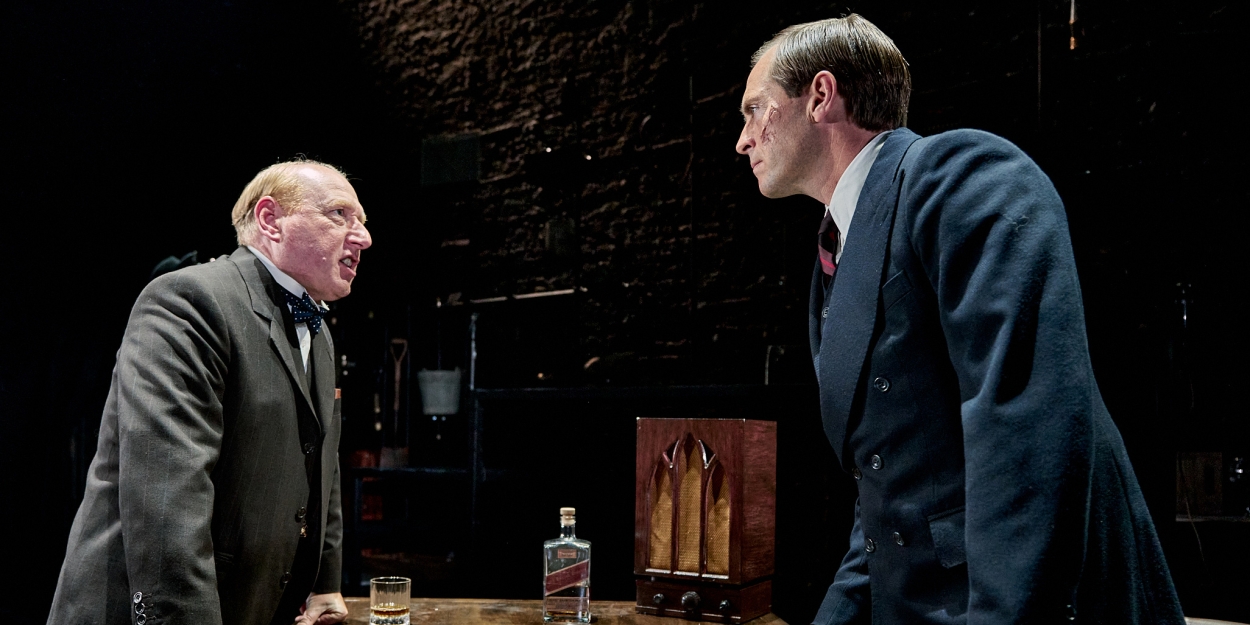Review: WHEN WINSTON WENT TO WAR WITH THE WIRELESS, Donmar Warehouse
Jack Thorne's icy political drama plays until 29 July

 As I write this, a notification from BBC News pings on my phone: “Trump pleads not guilty in a Miami court…” Is that poetry, irony, or something in between?
As I write this, a notification from BBC News pings on my phone: “Trump pleads not guilty in a Miami court…” Is that poetry, irony, or something in between?
When Winston Went to War with the Wireless may mark Jack Thorne’s third play currently running in London, but each new play of his still feels like an act of charity. With countless awards under his belt (five Baftas, three RTS television awards to name a few), and no doubt lucrative Netflix hits, you can be assured that another foray into theatre means he has something to say.
His latest return to theatre is a steel-coated document of the icy political waltz between the BBC, still in its infancy under the paternal eye of John Reith, and Winston Churchill, then Chancellor under Stanley Baldwin’s government during the 1926 general strike. They scrap and quibble like divorcing parents fighting over custody over the BBC and its coverage of the strikes.
Reith is the pragmatist who effortlessly improvises news broadcasts with paternal warmth and lyrical devotion. Stephen Campbell Moore emanates a humble magnetism as Reith, his tired eyes searching for spiritual solace. Opposite him stands Adrian Scarborough’s warthog-like Churchill who brilliantly wades and warbles through scenes with imperious charm.
The heart of the play emerges in the passive aggressive crossfire: what is it to control truth and speak truth to power? What does it mean to have a free press? The many parallels effortlessly reverberate across history. But Thorne never finger wags; he constantly and consistently goads his audience. We must answer for ourselves.
The play’s emotional weight gradually transitions to Reith himself. The Archbishop of Canterbury wants to broadcast a message to the nation. Churchill fears it will rally support for the strikers. Which way will Reith, a devout Christian, sway as the BBC struggles to wriggle from government’s grip?
The writing occasionally warps under its own weight here. Eager to paint Reith as a flawed character haunted by homosexual desire, illustrated by Brideshead Revisited-like flashbacks, It feels a little contrived. Reith’s wife Murial, a quietly devastating Mariam Haque, accuses him of hypocrisy, fighting for truth as a greater public good, but not a personal good as he shrinks away from confronting his sexual past. You can see her become the emotional lynchpin tying the themes together.
Katy Rudd is the real power here. Her direction has a mechanical, tactile sweatiness. It channels the curiosity of breaking open a radio and picking apart the copper wires to see how it conjures magic from the air. A primitive foley studio is laid out upstage, performers bash and squash everyday objects to create on stage sound effects. The nuts and bolts behind the illusion are laid bare, yet it gleefully retains its power to mesmerise.
The ensemble are excellent too, sleeves rolled up, they are a sweater-vested whirlwind who inject needed dynamism into the icy political duels.
When Winston Went to War With the Wireless plays at The Donmar Warehouse until 29 July
Photo Credit: Manuel Harlan
Reader Reviews

Videos
